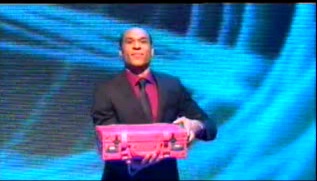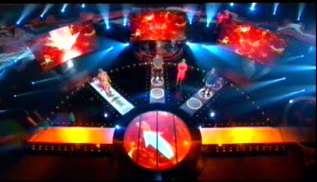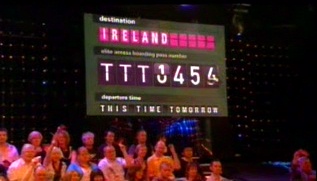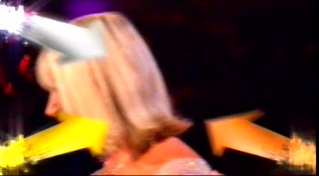Weaver's Week 2008-07-27
Last week | Weaver's Week Index | Next week
"When are the trains to Morrow?"
"Tomorrow?"
"Yes, to Morrow."
"Tomorrow."
Contents |
This Time Tomorrow
BBC Scotland, broadcast on BBC1
We could continue for pages upon pages of this two-person dialogue, until one of the interlocutors realises that the other is asking after transport to the city of Morrow, rather than generalised transportation in the subsequent 24-hour period. Though trite and tedious, it would still be more interesting than this show.
Tess Daly is our host, and (for professional and contractual reasons) the voice-off emphasises that she's Miss Daly. This will come as a surprise to her husband, ITV's chief banker Vernon Kay. She introduces the show by stating its premise. It's a very simple premise: raise lots and lots of money for The Lottery Corporation, some of which will help to fund a very expensive White Elephant in east London four years from now.
The mechanism by which this large amount of lolly will be raised is simple: they'll have to bribe people. Punters can pay a pound to enter into a specific White Elephant draw, with a ten-million-to-one chance of winning £500,000, and a ten-to-one chance of winning two quid. And, if that's not enough, they'll have to make a game show to promote the cause.
But what of the game? The central conceit is that, within 24 hours of the programme, the winners will be whisked off on a luxury holiday. They could, for instance, be staying at Glendalough Castle (a second prize on The Golden Shot in 1970, a third prize today. That's inflation!) Or they could be spending a week in Paris, or jetting off to Tokyo. Someone might even get a chance to see Dolly Parton in concert, and if you think we're going to make jokes about that being the night's booby prize, then you've got another thing coming. Two of them, in fact.
Ah, the spirit of The Two Ronnies. Far more entertaining than this show. Right, let's get to the subject of the review. Tess Daly is in Glasgow, for no adequately explored reason. Actually, why is she in Glasgow? Is it that the BBC built this huge new studio complex in the city and all they've got to show for it is the local drama River City and not much else? Is the Reporting Scotland team using the studio as a squash court when they're not on air? Could it be a quota-filling exercise, ensuring that The Lottery Corp. can't be criticised for spending *all* its money hundreds of miles away, just most of it? Are the rumours in this week's Creamguide correct, that the last series of Jet Set was recorded at the Pacific Quay studios, and Eamonn Holmes found his commute between there and his other job at Good Morning Isleworth too taxing. Even though the GMI studios are only just over the fence from Heathrow!
But we digress. Mrs. Kay is in Glasgow, and so are ten members of the public. And so is an excitable studio audience, who have quite clearly been fed sweet drinks and the entire secret stash of chocolate that Vic Galloway kept just in case Andi Peters ever came round. We'll see more of the audience later. For now, we shall concentrate on the ten people at the front of the stage.
Every show requires us to suspend some disbelief: in this case, that it's not recorded in the BBC's fine new facility in Glasgow, but is in a make-believe airport. There's a departure point, a waiting lounge, a baggage carousel, and an overly-camp air steward. The overly-camp air steward picks three bags off the carousel and, as is the modern way, opens them up for a look inside. To his surprise and astonishment, they contain pictures. And not just any old pictures, pictures of one of the contestants waiting in the lounge and pulling a "zany" face!
Three contestants are called forward, and stand at the end of a runway. It's not a very long runway, only about ten feet from front to back, and all three runways converge at a large circle. Tess Daly will have a quick chat with them, and we'll quickly see their travelling companion. She'll then ask some simple questions to the contestants, and they'll buzz in to give her the answer she requires. These are typical Saturday night questions, not too taxing, but not entirely obvious. A correct answer allows the contestant to step forward along the runway, an incorrect answer sends them back one step. The first two contestants to give a net total of three correct answers are deemed to have reached The Departure Point, and are winners; the third contestant is eliminated. Rather than reading off cards, Vernon's wife uses a wireless-linked laser-computer-display device, about the size of an Etch-a-Sketch.
At The Departure Point, the first contestant to arrive is given a glittering envelope containing the prize. They've not won it yet, there is one or more further questions to be answered. These always take the form, "This time tomorrow, you could be enjoying a hot-air balloon ride powered by Neil Kinnock. But —" and then the question goes off into territory that is only tenuously related to the prize. The contestant holding the tickets may choose to answer the question: a correct answer will retain the tickets, an incorrect one will hand them across to the opponent. Or the contestant may pass, in which case their opponent must answer correctly to take the tickets. Whoever holds the tickets after the requisite number of questions have been asked – one for the bronze prize, two for the silver, three for the gold prize – will win the contents of the envelope, and the prize described.
Or they may not. Rather than take the bronze or silver prize, the winner may choose to take an upgrade, relinquishing the chance to spend Bastille Day in Paris in favour of a trip to smoggy old Hollywood. It's a strange definition of "upgrade", but each to their own. Alan Dedicoat is the voice-off person on this show, and he does his best to sell the prize people could be winning if they're going for gold. Without the Hans Zimmer soundtrack. If they choose the upgrade, they're assured of being one of the three people playing in the Gold final, but will not be taking the prize they've won. In their stead, one of the studio audience will win the prize. Each member of the audience was given a "boarding pass" (numbered ticket) on the way in, and someone's number is read out. If they can answer a very simple question correctly, they win.
And, er, that's almost it. Yes, the show is interrupted by a commercial for one of The Lottery Corp.'s products; the plug for the other two occurs after the closing credit, and before the next programme. And yes, there's a chat with the four remaining contestants on the bench before the final trip round the carousel. These are hardly events to set the pulse racing.
Indeed, the whole show is hardly one to set the pulse racing. Any flow in the game is spoiled by the vast number of edits and cuts, all drawn to our attention by a swooshy graphic. Every time someone leaves the stage, their exit is marked by a swoosh. We may only see the sequence ten times in the 45-minute show, and it's always interesting to see what happened to CBBC's old and not-particularly-loved arrows logo, but we see it too often.
There are also far too many mentions of the show's title, "This time tomorrow". We must assume that Tess Kay is on some sort of bonus for dragging "This time tomorrow" into conversation. It's made all the more galling by the oh-so-shocking revelation that the programme was actually recorded at the start of June, for transmission over the summer. These people aren't going all the way up to Glasgow then off on their prize "This time tomorrow", within 24 hours. No, they're going up to Glasgow (a prize in itself), coming back home, waiting anything up to two months for their show to transmit, and only then do they get to go on their holiday. It's a bit of a swizz, really, not so much "This time tomorrow" as "This time on a Sunday quite some weeks away, probably."
And we have to wonder if the BBC isn't being a bit too exuberant in its descriptions of the prizes. ITV's regulator famously grouched at Sale of the Century for its habit of gloating over its prizes. Thirty years later, the BBC is certainly promoting this show only for its prizes, as if the only reason to tune in was to see someone winning an exotic holiday.
In all honesty, we really found the show a bit of a drag. All of the clichés of modern game shows are there – inviting too many people along, asking people to keep their signalling equipment out of shot, having contestants pull silly faces, getting people to wear badges saying "Tess's husband" in large letters and "Vernon" in almost unreadable print below. It's all present, none of it's correct when the show is this dull. In fairness, it's not quite as dull as Millionaire Manor, but if you ask us at 8pm on Friday what we'll be doing this time tomorrow, This Time Tomorrow won't be our answer.
The original version of this review incorrectly stated that This Time Tomorrow was an Endemol production. The show is actually made by BBC Scotland, and the review has been edited to remove inaccurate criticism.
Countdown Update
The world of Countdown was mildly shaken this week with the news that Des O'Connor will be leaving the show at the end of the current series. Mr. O'Connor, 94, has presented for two years, and is widely regarded as being amongst the four best presenters the show has ever had.
The world of Countdown was rocked to its very foundations this week with the news that Carol Vorderman will also be leaving at the end of December. Ms Vorderman, 21, has presented the show since its inception in 1982, and is widely regarded as being the best mental arithmetician and vital statistician in television history. La Vord has already put her side of the story in public, via the oh-so-reputable News of the World, and we expect to hear more grumblings over the summer break.
Back at the game, we've had five weeks of competition since the last Finals Week. Tony Gilgun was our carry-over champion, he won three games (286 points in total) before losing to Lee Simmonds. He looked set for great things, scoring 339 points in total, but was surprisingly defeated by Neil MacKenzie in a tight match. Neil MacKenzie is a professional footballer, playing for Notts County of Division IV, and managed something not even Rangers quite achieved last season – five wins in as many days. 409 points was his total, before losing to Katy Turner.
She was a one-game winner (164 points), but her 99-84 loss to Patricia Jamieson must be the best game of the season so far. Mrs. Jamieson won three games in total (332 points), and then came a run on the old Des Pots. Pat Hicks (147), Ben Jones (88), Chris Davies (137), Margaret Taroni (151), and Frank Larkin (142) all managed just one win, while Peter Young (196) had two. Alistair Kinnon brought some settled behaviour to the game, winning three games (287). Samira Mohamed is the current champion, she has two wins to her name, and quite possibly more.
We'll find out how she does when Countdown returns. As happened a few years ago, there's a summer break in the schedule, suggesting that the myriad calls for contestants are because the applicants are running dry. Or that Channel 4 would like to promote Come Dine with Me over the break. Either way, Countdown will return on 25 August, the bank holiday Monday. Before then, we'll have to think about who could be the show's new host, and new numbers wizard.
University Challenge
Match 3: Royal Veterinary College London v York
The word of the week is "spark", and it's answered by York. The campus university was only founded in 1963, it just feels like it's been around since the dawn of time. Since we last met a side from this university, one of the resident ducks, Trevor, has passed on. We'll get this over with quickly: York's team includes Tom Keene, reading music, unlike the band of a similar name; and Rob Mitchell (not the comedian). York copes well with a series of questions on nonsense, and the side is able to remember who won the BBC Sponsored Sports Personality of the Year last year, disconfusing Joe Calzaghe from Zara Philips. The first visual round is on written representations of Greek islands, and York's lead is 75-0.
We will profile the opposition, honest, they've just got to get one starter correct. It doesn't happen with the next starter, on Russian city names, picked up by York's dark destroyer, Magdalena Skoblar from Croatia. We would like to describe the look on Thumper's face when he read out the answer to a question about the software system GNU, but words do not do us justice, and neither does a still picture.
York suggests that the only English-language national descriptor for an EU member state ending in the letter D is "Flemard". The Royal Veterinary College say it's "Spaniard", which is correct! The RVC was founded in 1791 in Camden, and is now a part of the University of London. It specialises in veterinary medicine, and four-fifths of its undergraduates are female. Three-quarters of its team tonight are training to be vets, the other is a PhD student in mobili-viral pathology. Whatever that is. York restores normal service in the audio round, Puccini's work, and the side leads 145-10.
Who would you expect to get a question on animal biology? It goes to York, which almost doesn't surprise, and we may as well write "Game over" in our notebook.
Game over.
One starter after the audio round, still something like 12 minutes to play, and we reckon the game is as good as finished. The RVC picks up the Hidden Transmission Indicator of the Week, a set of questions that are surprisingly topical when judged by the programme's slot in the schedule. It's a series of questions on the Tour de France, not down to the level of "Either Evans is in yellow or he's not!" as ITV's commentator put it. The second visual round is Name That Footballer, and the RVC is at least justifying its place on the repechage board, but still trails 165-75.
York doesn't do well on a set of questions about motoring history, the RVC does only slightly better on a set about southern Italy, suggesting that the bite of a spider can be cured by performing the Macarena. York displays their knowledge of recent literature, and of renewable energy sources. When confronted with a list including Xerox and IBM and the date 1985, RVC come close with "WWW"; they were actually amongst the first companies to register com. domains – the world wide web was still five years away from being invented, and we have a faint recollection that email and Gopher used addresses that were the reverse of the present arrangements. At the gong, York has won, 215-95.
Though they did what they had to do to win the match, York didn't do tremendously brilliantly, correctly answering 15/42 bonuses. Paul Jones led with six starters. For the Vets, Rob Pope answered four starters correctly, the side made 8/18 bonuses and had the first three missignals of the series.
Next match: Surrey v Warwick
This Week And Next
ITV2 has been slapped down by OFCOM for its presentation of Pop Idleus. Apparently, the shows included videos of the contestants cavorting around a brand of car. ITV said that, though the clips sailed close to the wind, it had edited them to ensure there was no undue prominence to the fossil-burning motors. OFCOM disagreed, saying that the performances contained close-ups of the interior of the cars, and they did give undue prominence to the environmentally-catastrophic company. Product placement remains banned in this country.
Answering the question we posed earlier. Danny was Champion of the World in the Roald Dahl novel; St Wilfred brought Christianity to the Isle of Wight; PLUG, the Perth Linux User Group (a penguin being the symbol for the Linux computer system); "The Starlover and the Star" was written by Sir Philip Sidney; and a car horn may give toots. Danny, Wilfred, Plug, Sidney, and Toots are five of the Bash Street Kids, the set is completed by Erbert, Spotty, Fatty, and Smiffy.
Ratings for the week to 13 July give This Time Tomorrow and Last Choir Standing a dead-head on 4.4m viewers – TTT down almost a million on last week – and Celebrity Masterchef 4.25m. Big Brother had 4m, Who Dares Sings! 3.7m, and 8 Out of 10 Cats ended its series with a best score, 3.2m. The returning Mock the Week led on BBC2 with 2.85m, and the return of Superstars was seen by 1.45m.
Good news for Stephen Fry as QI led the digital channels with 610,000 viewers. America's Got Talent had 570,000, Come Dine With Me had 530,000, and BB Big Mouth 500,000. On Living, Britain's Next Top Model had a season-best 415,000.
Coming up next week, a new series of Who Wants to be a Superhero? begins on Sci-Fi at 8pm tonight. It's a silly show that (mercifully) doesn't take itself at all seriously. And we're really pleased that Paddy O'Connell's getting a decent television gig, Battle of the Brains (BBC2, 6pm weekdays) is a team-based quiz that we'll have to see to understand.
To have Weaver's Week emailed to you on publication day, receive our exclusive TV roundup of the game shows in the week ahead, and chat to other ukgameshows.com readers sign up to our Yahoo! Group.







